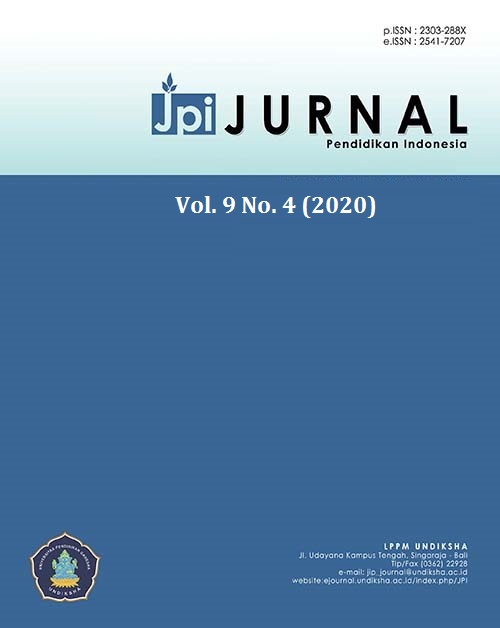Effectiveness of Teacher Professionalism in The Science Process Skills of Students
DOI:
https://doi.org/10.23887/jpi-undiksha.v9i4.22904Keywords:
Science Process Skill, Professional Teacher, Biology TeacherAbstract
The scientific ability of students who are under international average standards compels them to continuously improve education quality in Indonesia. The inequality understanding of scientific process skills in districts like in Sragen is worth the attention. Teachers as the education core should be able to professionally develop the scientific process skills of participants. The research aims to determine the professional influence of teachers on the skills, including knowing the profile of the skills, mastery of the skills’ aspects. This research is a quantitative descriptive survey. The study was conducted on 198 students and biology teachers. Collecting student data with tests and teachers with questionnaires and interviews. Results show the skills in Sragen categorized as medium to average 19.22 of 32, the highest mastery of the skills’ aspects are communicating and predicting, the lowest is identifying variables, collecting and processing data, there is a professional influence of teachers on the skills.
References
Aziz, H. A. (2012). Karakter Guru Profesional. Al-Mawardi Prima.
Brotherton, P. N., & Preece, P. F. W. (1996). Teaching science process skills. International Journal of Science Education, 18(1), 65–74. https://doi.org/10.1080/0950069960180106
Eriksson, K., Helenius, O., & Ryve, A. (2019). Using TIMSS items to evaluate the effectiveness of different instructional practices. Instructional Science, 47(1), 1–18. https://doi.org/10.1007/s11251-018-9473-1
Haji, S., Yumiati, Y., & Zamzaili, Z. (2018). Analisis Kesulitan Siswa dalam Menyesaikan Soal-Soal PISA (Programme for International Student Assessment) di SMP Kota Bengkulu. Jurnal Pendidikan Matematika Raflesia, 3(2), 177–183. https://doi.org/10.33449/jpmr.v3i2.7522
Hakim, A. (2015). Contribution of competence teacher (pedagogical, personality, professional competence and social) on the performance of learning. The International Journal of Engineering and Science, 4(2), 1–12. https://www.academia.edu/download/36989616/A42301012.pdf
Hamka, L., Asmawati, A. A., Muhiddin, P., & Rachmayani, A. (2013). Kompetensi Profesional Guru Biologi Sekolah Menengah Atas Negeri di Kota Makassar. Bionature, 14(1). https://ojs.unm.ac.id/bionature/article/view/1444
Juhji, J. (2016). Peningkatan keterampilan proses sains siswa melalui pendekatan inkuiri terbimbing. Jurnal Penelitian Dan Pembelajaran IPA, 2(1), 58–70. http://dx.doi.org/10.30870/jppi.v2i1.419
Khairunnisa, K., Ita, I., & Istiqamah, I. (2020). Keterampilan Proses Sains (KPS) Mahasiswa Tadris Biologi pada Mata Kuliah Biologi Umum. BIO-INOVED: Jurnal Biologi-Inovasi Pendidikan, 1(2), 58–65. http://dx.doi.org/10.20527/binov.v1i2.7858
Kusnandar. (2011). Guru Profesional. Rajawali Press.
Lightburn, M. E., & Fraser, B. J. (2007). Classroom environment and student outcomes among students using anthropometry activities in high‐school science. Research in Science & Technological Education, 25(2), 153–166. https://doi.org/10.1080/02635140701250576
Purwanto, M. N. (2000). Prinsip-Prinsip Dan Teknik Evaluasi Pengajaran. PT Remaja Rosdakarya
Puspendik. (2019). Laporan Hasil Ujian Nasional. https://hasilun.puspendik.kemdikbud.go.id
Putra, N. A. R., Abdurrahman, A., & Suana, W. (2015). Pengaruh Keterampilan Proses Sains dan Sikap Ilmiah terhadap Pemahaman Konsep IPA Siswa SMP. Jurnal Pembelajaran Fisika, 3(4). http://jurnal.fkip.unila.ac.id/index.php/JPF/article/view/8861
Rahmasiwi, A., Santosa, S., & Sari, D. P. (2015). Improving Student’s Science Proces Skill in Biology Through The Inquiry Learning Model in Grade XI MIA 9 (ICT) SMA Negeri 1 Karanganyar Academic Year 2014/2015. Proceeding Biology Education Conference: Biology, Science, Enviromental, and Learning, 12(1), 428–433. https://jurnal.uns.ac.id/prosbi/article/view/6958
Rauf, R. A. A., Rasul, M. S., Mansor, A. N., Othman, Z., & Lyndon, N. (2013). Inculcation of science process skills in a science classroom. Asian Social Science, 9(8), 47–57. https://doi.org/10.5539/ass.v9n8p47
Rezba, R., Mcdonnough, J. T., Matkins, J. J., & Sprague, C. (2007). Science process skills. Hunt Publishing Company.
Sa’diyyah, M., Subali, B., & Paidi, P. (2016). Kemampuan Berpikir Divergen dalam Keterampilan Proses Sains Peserta Didik SMA Negeri di Kabupaten Kulon Progo pada Mata Pelajaran Biologi Ditinjau Berdasarkan Latar Belakang Pendidikan Guru. Pend. Biologi-S1, 5(7), 38–49. https://eprints.uny.ac.id/31050/1/Ana%20Fitri%20Apriliyani.pdf
Sari, I. N., Azwar, I., & Riska, R. (2017). Kontribusi keterampilan proses sains siswa terhadap hasil belajar siswa pada materi wujud zat dan perubahannya. Jurnal Pendidikan Informatika Dan Sains, 6(2), 257–266. http://dx.doi.org/10.31571/saintek.v6i2.651
Siswono, H. (2017). Analisis Pengaruh Keterampilan Proses Sains Terhadap Penguasaan Konsep Fisika Siswa. Momentum: Physics Education Journal, 1(2), 83–90. https://doi.org/10.21067/mpej.v1i2.1967
Smylie, M. A. (1997). From bureaucratic control to building human capital: The importance of teacher learning in education reform. Arts Education Policy Review, 99(2), 35–38. https://doi.org/10.1080/10632919709600769
Sudiana, N. (1989). Dasar-Dasar Proses Belajar Mengajar. PT Sinar Baru Algensindo.
Suhardi. (2013). Pengembangan Sumber Belajar Biologi. UNY Press.
Sund, R. B., & Trowbridge, L. W. (1973). Teaching Science By Inquiry In The Secondary School. Merrill Publishing Company.
Supovitz, J. A., Mayer, D. P., & Kahle, J. B. (2000). Promoting inquiry-based instructional practice: The longitudinal impact of professional development in the context of systemic reform. Educational Policy, 14(3), 331–356. https://doi.org/10.1177%2F0895904800014003001
Supovitz, J. A., & Turner, H. M. (2000). The effects of professional development on science teaching practices and classroom culture. Journal of Research in Science Teaching: The Official Journal of the National Association for Research in Science Teaching, 37(9), 963–980. https://doi.org/10.1002/1098-2736(200011)37:9%3C963::AID-TEA6%3E3.0.CO;2-0
Udin, M., Arsyad, M., & Khaeruddin, K. (2013). Peningkatan Keterampilan Proses Sains Melalui Model Pembelajaran Berdasarkan Masalah Pada Siswa Kelas SMA 14 Makassar. Jurnal Pendidikan Fisika, 1(2), 139–148. https://doi.org/10.26618/jpf.v1i2.197
Utomo, A. P., Yuana, K., Narulita, E., Fikri, K., & Wahono, B. (2018). Students’ errors in solving science reasoning-domain of trends in international mathematics and science study (TIMSS). Jurnal Pendidikan IPA Indonesia, 7(1), 48–53. https://doi.org/10.15294/jpii.v7i1.11352
Downloads
Published
Issue
Section
License
Authors who publish with the Jurnal Pendidikan Indnesia agree to the following terms:
- Authors retain copyright and grant the journal the right of first publication with the work simultaneously licensed under a Creative Commons Attribution License (CC BY-SA 4.0) that allows others to share the work with an acknowledgment of the work's authorship and initial publication in this journal.
- Authors are able to enter into separate, additional contractual arrangements for the non-exclusive distribution of the journal's published version of the work (e.g., post it to an institutional repository or publish it in a book), with an acknowledgment of its initial publication in this journal.
- Authors are permitted and encouraged to post their work online (e.g., in institutional repositories or on their website) prior to and during the submission process, as it can lead to productive exchanges, as well as earlier and greater citation of published work. (See The Effect of Open Access)








